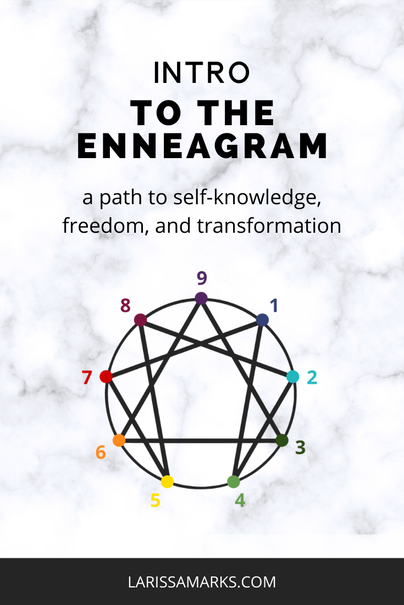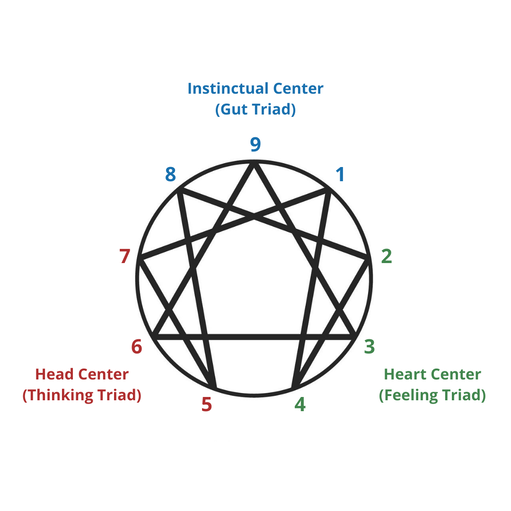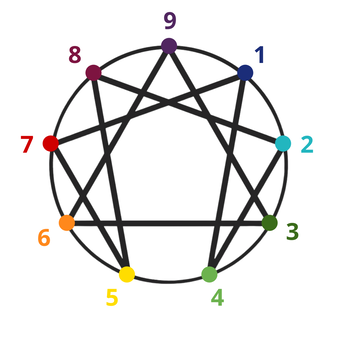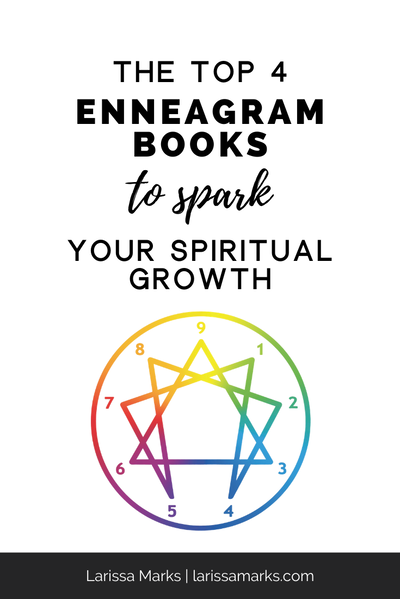|
I’ve done a significant amount of training, seminars, and assessments in the areas of personal, spiritual, relational, and professional growth. From Myers-Briggs to StrengthsFinder to APEST, and many more, there are lots of wonderful tools to equip us for self-awareness and growth. Each of them has its strengths and limitations. But let me tell you that one of the most useful tools I've found for growth and transformation is the Enneagram. There is no way I can do a comprehensive exploration of the Enneagram in one blog post, but I'd like to give you an overview of what it is, a look at the nine personality types and their primary features, and how to explore it for yourself. What is the Enneagram? The Enneagram is a personality typology that helps us identify specific patterns of personality by describing the traits of nine distinct types. The personality types and connecting lines between them form the symbol that is the Enneagram ("ennea" meaning nine and "gram" meaning drawing). Each type within the Enneagram sees the world differently, and interprets why one thinks, feels, and behaves in particular ways. The Three Centers of Intelligence Each of the 9 types is grouped in a triad, according to a common predominant "center of intelligence": body/gut, heart/feeling, or head/thinking. Each of us functions through the three different centers of intelligence, but have one primary center of intelligence that dominates how we perceive, process, and express. Each center's function has its advantages and disadvantages - ways that help us interpret and interact with the world, and ways it can steer us off course. The Instinctual Center (Types 1, 8, and 9) corresponds to our instinctual functions: when thought initiates movement within you. Impulses from the instinct, or gut, center can be a solid guide to right action. The Heart Center (Types 2, 3, and 4) regulates the feeling function: the experiences and expression of emotions. It allows you to feel emotions and connect to others through empathy. The Head Center (Types 5, 6, and 7) regulates the thinking function: the experience and expression of thoughts, beliefs, and other cognitive ability. This is essential to analysis and reasoning. By identifying your triad first, you can eliminate the other six types and focus on which of the three types in your triad is your main type. The Nine Personality Archetypes The nine personality archetypes within the Enneagram have a highly accurate articulation of the automatic patterns associated with each type. Each type has a habitual "focus of attention," prominent patterns of thinking, feeling, and behaving, Each of us will identify with different features from all of the nine types, but there is one dominant type that is our primary one. Below are brief descriptions of the nine types, including their primary characteristics, and core fears and desires. Type 1: Moral Perfectionist Primary Characteristics: Principled, purposeful, self-controlled, perfectionistic. At Their Best: Ethical, reliable, productive, wise, idealistic, orderly, self-disciplined. Focus of Attention: Ones focus on noticing error in the form of deviations from an internally generated ideal, discerning right and wrong, and relying on rules and structure. Core Desire: To have integrity, balance, be virtuous, to be ethical, to be good. Core Fear: Fear of being bad, evil, angry, wrong, corrupt, or irresponsible. Core Weakness: Anger and resentment. Ones repress their anger, and express criticism. Type 2: Supportive Advisor Primary Characteristics: Generous, demonstrative, people-pleasing, possessive. At Their Best: Loving, compassionate, nurturing, generous, supportive, hospitable, tuned into people's feelings. Focus of Attention: Twos focus on relationships, gaining approval, and seducing others through helpfulness as a strategic way to get their needs met. Twos read the people around them and align with others' moods and preferences in order to maximize the potential for positive connection. Core Desire: To feel loved and wanted. Core Fear: Fear of being unloved or unwanted for being purely themselves. Core Weakness: Pride. Twos have an inability or unwillingness to acknowledge their own suffering and needs. Type 3: Successful Achiever Primary Characteristics: Adaptable, excelling, driven, image-conscious. At Their Best: Optimistic, energetic, goal-oriented, industrious, self-affirming, team-builder. Focus of Attention: Threes focus their attention on tasks and goals to create an image of success in the eyes of others. Threes identify with their work, believing they are what they do, and lose touch with their authentic selves. Core Desire: To feel valuable and worthy by being themselves without having to perform. Core Fear: Being worthless, a failure, incapable, unimpressive, unsuccessful, or exposed. Core Weakness: Deceit. Threes deceive themselves into believing they are only the image they present to others. Type 4: Romantic Individualist Primary Characteristics: Expressive, dramatic, creative, self-absorbed. At Their Best: Compassionate, authentic, introspective, supportive. Focus of Attention: Fours focus attention on their own feelings, other people's feelings, and interpersonal connection and disconnection. They feel a lack in their own worth, so they seek romanticized, idealized experiences of qualities they perceive as outside themselves. Core Desire: To find themselves and their unique significance. Core Fear: Fear of being inadequate, emotionally disconnected, plain, ordinary, common, mundane, abandoned, or defective. Core Weakness: Envy. Fours feel that something fundamental is missing in them, and that others possess qualities they lack. Type 5: Investigative Thinker Primary Characteristics: Perceptive, innovative, secretive, cynical. At Their Best: Analytical, wise, objective, curious, sensitive, persevering. Focus of Attention: Fives believe knowledge is power, so they like to observe their surroundings without getting too involved (especially emotionally). They focus on accumulating information, and manage their time and energy by avoiding entanglements with others. Core Desire: To be capable and competent. Core Fear: Fear of being ignorant, overwhelmed, dependent, empty. Core Weakness: Avarice. Fives feel they lack inner resources and that too much interaction will lead to depletion. This leads to Fives isolating and withdrawing. Type 6: Loyal Guardian Primary Characteristics: Responsible, engaging, anxious, suspicious. At Their Best: Loyal, prepared, trustworthy, likeable, compassionate, witty, practical, responsible. Focus of Attention: Sixes focus on thinking about what might go wrong and strategizing and preparing for it. Sixes have an adaptive strategy that centers on detecting threats and coping with fear. Core Desire: To have security and support. Core Fear: Fear of fear itself, danger, uncertainty, chaos, abandonment. Core Weakness: Fear and Anxiety. Sixes live in a constant state of apprehension and worry about possible future events. Type 7: Entertaining Optimist Primary Characteristics: Fun-loving, spontaneous, scattered, charming. At Their Best: Imaginative, confident, productive, enthusiastic, versatile. Focus of Attention: Sevens avoid unpleasant feelings by focusing on what feels pleasant, positive, and pleasurable, especially positive future possibilities. A fear of discomfort fuels quick thinking and creative problem-solving. Core Desire: To be fully satisfied and content. Core Fear: Fear of being incomplete, bored, trapped in emotional pain, limited. Core Weakness: Gluttony. Sevens overcome feelings of inner emptiness by pursuing positive, stimulating ideas and activities. Type 8: Protective Challenger Primary Characteristics: Confrontational, willful, self-confident, decisive. At Their Best: Protective, empowering, loyal, inspiring, resilient, energetic. Focus of Attention: Eights focus on power and control - who has it and who doesn't, and how it's wielded. They are big picture thinkers, and usually don't like dealing with details. They see the world as being divided into "the strong" and "the weak," and they identify with the strong to avoid feeling weak. Core Desire: To protect themselves. Core Fear: Fear of being weak and vulnerable, underestimated, disempowered, humiliated, controlled, manipulated, and unjustly treated. Core Weakness: Lust (for power). Eights have a constant need for intensity, control, and power, and they assert themselves willfully. Type 9: Peaceful Mediator Primary Characteristics: Agreeable, harmonious, reassuring, receptive. At Their Best: Peaceful, generous, patient, accepting, pleasant, empathetic, diplomatic. Focus of Attention: Nines focus their attention on others, their environment, and on avoiding conflict and achieving harmony. Nines typically tuned into the needs and wants of others, but do not not have a clear sense of themselves, and their own motives and desires. Core Desire: To have inner stability and peace of mind. Core Fear: Fear of being loveless, in conflict, overlooked, separate, uncomfortable, discord, alone. Core Weakness: Sloth. Nines are asleep to themselves, their needs, desires, and abilities, and resist bringing their full selves to all of life. How do you figure out your type? It takes time and self-examination to discern our dominant number. Every person is unique, and experiences their personality and the world differently. Each person has characteristics of other numbers. Therefore, figuring out your type is not as simple as taking a quick test and getting the results. The Enneagram is meant to be discerned over time, through self-reflection, prayer, conversations with people who know us, attentiveness, curiosity, and learning. You may initially see yourself in a few numbers. Or you may think you're one type for a while before realizing your actual type is a different one. I encourage you that as long as you keep doing good inner work, ask good questions, and keep learning, you will find your type and reap the valuable benefits the Enneagram offers. I used to endorse online Enneagram tests, but now I do not. Enneagram tests, even the most "accurate" ones, are the least effective way to discern your Enneagram type. There is a sacred journey in the discovery and uncovering of yourself, and I now advocate for different ways of figuring out your number. Here are a few suggestions on ways to figure out your type:
The purpose of the Enneagram is transformation - transformation in your inner self, your relationships, your work, and how you navigate the world around you. If you are ready for transformation, I invite you to dig deeper into the Enneagram, and experience it for yourself. If you want to learn more about the Enneagram, and find ways to use Enneagram wisdom to grow, reach out to me. I integrate it in my work as a spiritual director and formation coach. Have you discovered the Enneagram? How has that journey been for you? You might also enjoy reading: The Top 4 Enneagram Books to Spark Your Spiritual Growth 6 Simple Questions For Self-Reflection How to Use the Wheel of Life Want guidance and inspiration for your spiritual journey delivered to your inbox?
Sign up for my email newsletter Notes From Larissa:
The Enneagram is a system of personality typing that can be a valuable tool for spiritual growth. Perhaps you've heard about it, or have used it in your own journey of self-discovery.
I first came across the Enneagram about 15 years ago, and have continued to find so much to learn from it (in case you're wondering, I'm a type 1 with a 2 wing). It has been a source of wisdom for me in my relationships, my sense of self, and my relationship with God. If you haven't yet discovered the Enneagram, I encourage you to jump in! You can begin with a good book (which I will share about below), or explore online at The Enneagram Institute. Because of my ongoing work in the Enneagram, both personally and with others as a spiritual director, I've read many books on the subject. There are a lot out there, especially as more people discover the Enneagram and interest in it has grown. A common Enneagram question I hear is, "I want to learn more, but where do I begin?" In response, I often find myself recommending the same books over and over again, so I decided to put together a list of my favorites. These are all books I've read and referenced multiple times. I actually wanted to round out the list with a fifth book, but nothing else quite made the cut. These four books are my go-tos. Here is the short list of Enneagram books I recommend (click on the book or title for affiliate links):
Have you explored the Enneagram? What books do you recommend? Please share in the comments!
You might also enjoy reading:
10 Great Books to Ignite Your Spiritual Growth 6 Simple Questions For Self-Reflection How to Use the Wheel of Life
Want guidance and inspiration for your spiritual journey delivered to your inbox?
Sign up for my email newsletter Notes From Larissa! Let’s state it clearly: One great idea of the biblical revelation is that God is manifest in the ordinary, in the actual, in the daily, in the now, in the concrete incarnations of life, and not through purity codes and moral achievement contests, which are seldom achieved anyway.” This morning I rolled out of bed, put on clean-ish clothes, and went through my morning ritual of making my pour-over coffee. I fed my almost-2-year-old daughter her breakfast, checked email, and as an afterthought, turned my awareness to God. It was like a silent, "Hey there, God." An acknowledgement of his presence with me, a welcoming him into the ordinary-ness of my day. On mornings like this, when life seems so normal and routine, I am thankful that God is present in the ordinary. I am thankful that God isn't only in the flashy and extraordinary. Because if that were true, my mostly ordinary life would seem to be missing the mark. So I am grateful. But I also recognize that I want more of this. I want to know and encounter more of God in my actual life. So I invite God in. I ask him to help me see him and hear him in the ordinary. After I pray this, my daughter asks for a snack. So we toast some bread, and take our morning snack outside on the porch. We sit together for a while, my daughter is thrilled by the passing airplanes and garbage trucks. Then she turns to me, "Mama, kiss?" She plants a sloppy toddler kiss on my face. And in this moment, I sense God delighting in the moment with us. I wonder how our lives would change if we became more aware of God's presence? How might we react to the interruptions? How would we treat the people we unexpectedly encounter? How would we experience our errands and household chores? I am learning how to welcome God into my ordinary. I invite you to do the same. ACTION & PRACTICE Take a moment to simply be with God. Turn your awareness to his presence with you. Invite him to reveal himself right now. Ask him to help you see and hear him in the ordinary today. How aware of God are you in your daily life? How do you encounter God in the ordinary? Please share in the comments. If you enjoyed this post, check out these related posts: Questions That Lead Us to Transformation How to Pay Attention to the Health of Your Soul Permission to Want and Desire Want guidance and inspiration for your spiritual journey delivered to your inbox?
Sign up for my email newsletter Notes From Larissa. |
WELCOMEHi, I'm Larissa. I am an artist and spiritual director on the island of O'ahu in Hawai'i.
SEARCH THE BLOGSUBSCRIBESign up for my email newsletter Notes From Larissa.
TOP POSTSCATEGORIES
All
ARCHIVES
March 2024
|










